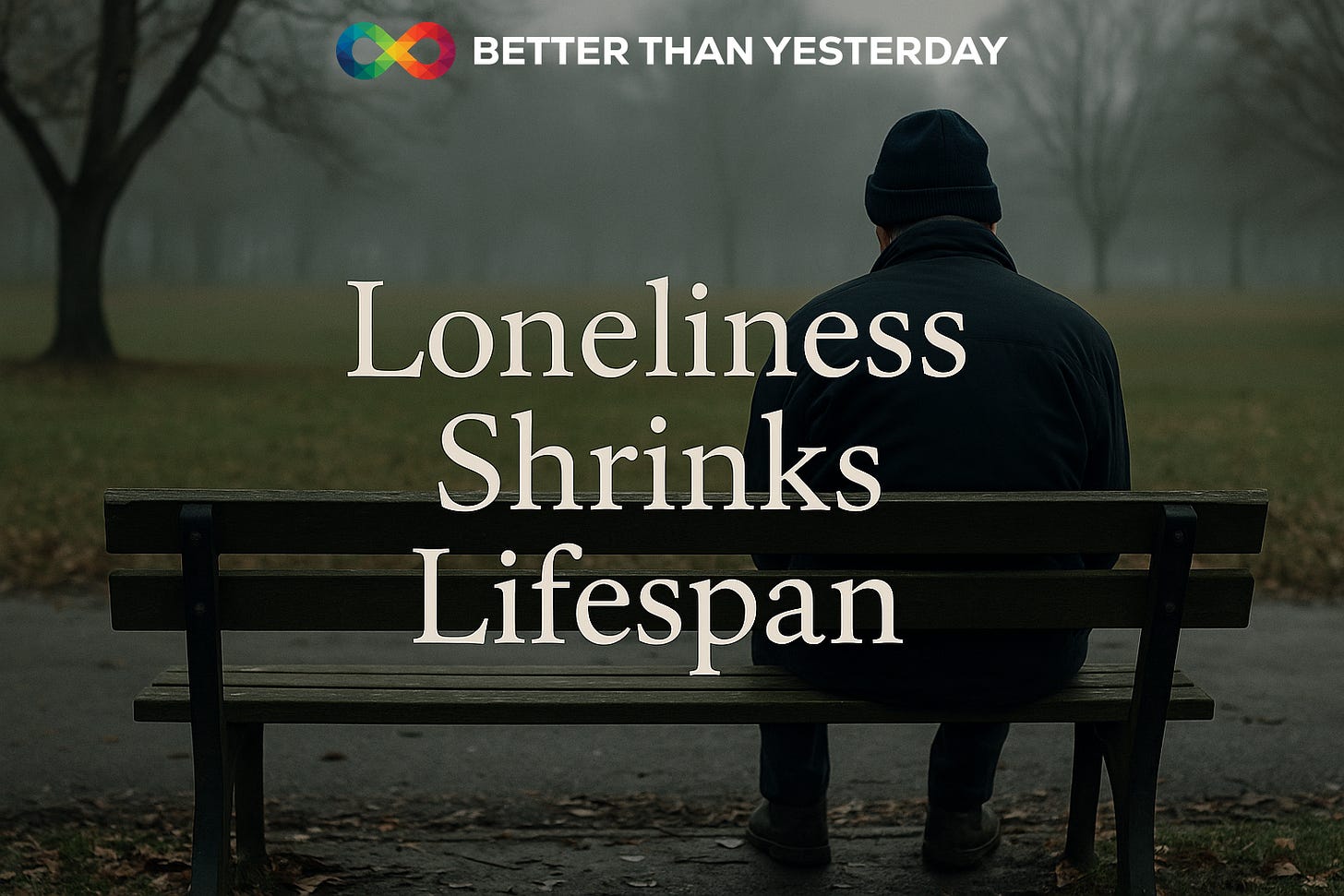Loneliness Shrinks Lifespan — And Science Now Knows Why
New research links chronic loneliness to strokes, early death, and worse outcomes than poor diet or lack of exercise. Here’s how to fix it.
We talk a lot about diet, sleep, fasting, supplements… but there’s one longevity lever that gets ignored way too often: your social life.
And no, this isn’t a fluffy “laugh with your friends” post. This is hard science. In 2024, The Lancet and JAMA Network both dropped new data on the life-shortening effects of loneliness — and the numbers are brutal.
Let’s break it down.
🚨 Loneliness Isn’t Just Sad — It’s Deadly
Feeling lonely now and then? Fine.
But if it becomes chronic, your brain and body shift into survival mode.
In a large 2024 study published in eClinicalMedicine, older adults who reported chronic loneliness had a 25% higher risk of stroke. Not stress. Not bad genes. Stroke.
And that’s not even the worst of it.
In another huge study from JAMA Network Open (398,972 people), researchers found that social isolation was more predictive of early death than diet, alcohol, or physical activity.
👉 In people with obesity, reducing loneliness and isolation reduced their risk of dying from any cause — even without losing weight.
🧬 How Loneliness Hurts Your Body
So why is this happening? How does feeling disconnected actually harm your cells?
The short answer: loneliness triggers low-grade inflammation and messes with your health habits.
Here’s what researchers observed in lonely people:
🔥 Higher inflammatory markers
🚫 Less physical activity
🧁 More ultra-processed food
😴 Poor sleep hygiene
💊 Skipped medications
🥃 More alcohol and smoking
Over time, this leads to cardiovascular stress, blood sugar imbalances, and immune system decline. Combine that with unhealthy behavior patterns and you’ve got a dangerous cocktail.
It’s not just a vibe — loneliness becomes a physiological state.
❤️ Why Social Support Is a Superpower
The opposite of loneliness isn’t popularity — it’s meaningful connection.
Studies found that simple social habits — like sharing meals, walking with friends, or even calling loved ones regularly — were associated with better medication compliance, less inflammation, and lower mortality risk.
This works across all ages and health backgrounds. But the protective effect was especially strong in older adults and people with chronic conditions.
In other words:
Your community is medicine — and it’s totally free.
📊 Social Isolation vs. Loneliness: What’s Worse?
They’re not the same.
Social isolation = lack of contact (you don’t see or talk to people)
Loneliness = feeling emotionally disconnected (even when around others)
According to the 2024 JAMA study, social isolation had a stronger link to early death than loneliness.
That means it’s not just about how you feel — it’s also about what you actually do.
👉 You could feel fine being alone… but your body still reacts negatively to a lack of real interaction.
🧠 Loneliness and Stroke Risk — The Shocking Connection
Let’s go back to that Lancet paper.
It wasn’t just that loneliness made people sad — it made them physically vulnerable to strokes.
In fact, people who reported consistently high loneliness had a 56% higher risk of experiencing a stroke — even after controlling for depression and social isolation.
The takeaway?
Loneliness acts like a biological stressor, impairing blood flow, immune function, and neurological health.
And it doesn’t take decades. The effects show up within a few years, especially if loneliness becomes chronic.
✅ Biohacking Your Social Life (Yes, That’s a Thing)
Here’s the fun part — you can reverse the damage.
Loneliness and isolation are modifiable risk factors. That means they’re fixable.
Try these simple social biohacks (backed by real science):
Phone a friend 📞
Not texting. Actual voice. Just 5–10 minutes a day can improve heart rate variability.Eat together 🥗
Regular meals with others reduce stress markers and improve digestion.Group movement 🚶
Join a walking group, yoga class, or even a casual run club.Give support 🤝
Helping others boosts your own oxytocin and emotional resilience.Book social time like a supplement ⏰
Make it non-negotiable — not “if I have time,” but “because it’s health.”
🧩 But I’m an Introvert…
Good news: You don’t need to be social all the time.
Studies show that quality matters more than quantity.
What matters is that you regularly engage in authentic connection — even if it’s with just one person, once a week.
Small consistent actions beat big once-a-year gatherings.
🔄 What Happens When You Improve Your Social Life?
Let’s look at what changed in people who reduced isolation in the JAMA study:
🔻 36% drop in all-cause mortality (in people with obesity)
🔻 Lower risk of cardiovascular disease
🔻 Better medication adherence
🔻 Improved mental health
🔻 Fewer hospitalizations
All of that — just from feeling more connected.
Not a pill. Not a new diet. Just real human connection.
💬 Our Final Thoughts
Loneliness is a public health issue — not just an emotional one.
If you care about your healthspan, make social connection part of your daily routine. It's as powerful as food, exercise, or sleep. Maybe even more.
You don’t need hundreds of friends.
You just need a few good ones — and a reason to reach out.
So today, text someone. Better yet, call them.
Go for a walk together. Invite them for lunch. Ask how they really are.
Because biohacking isn’t just about NAD+ and magnesium.
It’s about being human. Together.



